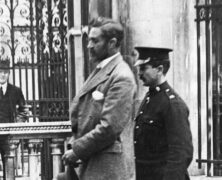Recent events in France ensure that that country remains an important focal point for anyone interested in world affairs. Many of us perhaps fall into the trap of believing that terrorism is a recent phenomenon; it certainly isn’t. The French themselves have been masters of it, in France itself, in Africa (Algeria is a notable example) and elsewhere. The tragic and brutal slaying of innocent people in the streets of Paris and in France’s other cities and towns has precedent. Those of us familiar with the French Revolution from school may know that the guillotine was used to kill the king and later his wife. The names Robespierre and Napoleon ring bells. However, we may not know a whole lot more besides. Christopher Hibbert’s highly readable and detailed account of the Revolution is a real eye-opener. His treatment of the subject is thorough without being exhaustive or overly dense. He is particularly strong on the personalities involved, Mirabeau and Danton being two of my favourites. It all starts with the king. King Louis XVI strikes one as a man unsuited to the throne. He was smallish, with poor posture and reputedly impotent. He liked to read and was disciplined enough to teach himself English. But he liked to eat and his wife, Marie Antoinette, felt the need to deny him access to pastry. She, for her part, was Austrian and rumours abounded of her sexual exploits and infidelity. It was eight years before she bore her husband their first child. In the late eighteenth century, about 26,000,000 people lived in France, the vast majority of them in the countryside, working in agriculture. Poverty was widespread; Hibbert quotes two English travellers’ observations of “terribly ragged” children and peasants with the appearance of “ravenous scarecrows.” Taxes...
Roger Casement’s Bones...
posted by Cloud
It was one of those coincidences that happens to me every so often I think because I like to read. I picked up a copy of The Irish Times (Wednesday August 3rd 2016) and saw an article by Eileen Battersby: “Casement: romantic defender of the oppressed.” I knew a little about the man. He was a colourful figure, although that phrase “colourful figure” troubles me a little now as I write it. I always liked his face for some reason; it was the visage, I liked to imagine, of a man with compassion, a misunderstood man, maybe even a tormented soul. There was his involvement with the Rising of 1916, his gun-running, his subsequent arrest and execution. Hadn’t he delivered one of those masterful speeches while in the maw of destructive justice, akin to Robert Emmet? He’d served, I knew, as some kind of investigative civil servant in areas of the world still considered to be God-forsaken backwaters like Congo. His story read like a Hollywood script: a man going from being one of the Empire’s own to a wretched, traitorous homosexual with a complicated story. Battersby tells us that it’s been a hundred years since his death, “a horrible death.” He was hanged at Pentonville Prison in London at the age of 51 despite several very famous figures intervening on his behalf such as W.B. Yeats and George Bernard Shaw. Battersby predictably enough argues that his homosexuality probably didn’t help his case, being what she calls “a Victorian homosexual.” It’s hard to imagine she’s wrong. One thinks of Oscar Wilde and others who were treated shamefully because of their sexuality. Perhaps it didn’t matter that Casement was a humanitarian who exposed injustices in parts of the world most people at the time as...


